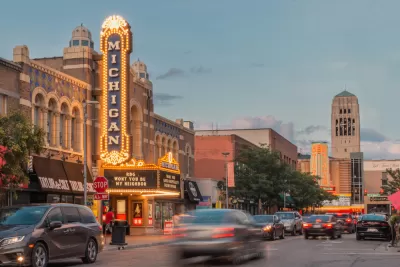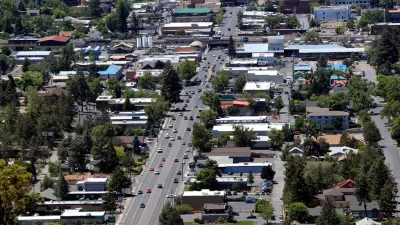Ann Arbor, Michigan approved changes to the city’s Unified Development Code (UDC) earlier this week that eliminate off-street parking requirements for a variety of development types throughout the city.

The Ann Arbor City Council voted earlier this week to eliminate parking requirements throughout the city—another incremental step for the parking reform movement built on the research and rhetoric of Donald Shoup, author of the High Cost of Free Parking.
Josh Hakala reported the news of the zoning changes for WEMU, after the news of the vote was left to circulate on Twitter for an entire day. Hakala’s brief account of the news includes a soundbite from Ann Arbor Councilmember Erica Briggs.
“According to Briggs, by eliminating unnecessary parking, developments are able to save money, which makes housing and businesses more affordable. She says by reducing the amount of asphalt and using less space for parking, the city can be more walkable, which is good for the environment,” writes Hakala.
A city staff report prepared in advance of the vote lists the kinds of land uses that would no longer require minimum numbers of parking spaces to include residential occupancies, adult and child care centers, outdoor recreation, transit corridor developments, and nonprofit corporations. Other changes, like changes to the Required Parking-Calculating Required Parking section of the UDC were also approved by the city council.
For more analysis of the vote, see a blog post by Nat. M. Zorach for the Handbuilt City. According to Zorach’s assessment, the zoning changes implemented by Ann Arbor “may bode well for a region that has struggled to adopt more progressive transportation and land use policy measures.”
Zorach’s coverage, linked in the source article below, includes background on parking requirements and the intended goals of reforms like those approved in Ann Arbor.
FULL STORY: Ann Arbor Axes Parking Minimums. In Michigan, That’s Huge.

Planetizen Federal Action Tracker
A weekly monitor of how Trump’s orders and actions are impacting planners and planning in America.

Congressman Proposes Bill to Rename DC Metro “Trump Train”
The Make Autorail Great Again Act would withhold federal funding to the system until the Washington Metropolitan Area Transit Authority (WMATA), rebrands as the Washington Metropolitan Authority for Greater Access (WMAGA).

The Simple Legislative Tool Transforming Vacant Downtowns
In California, Michigan and Georgia, an easy win is bringing dollars — and delight — back to city centers.

The States Losing Rural Delivery Rooms at an Alarming Pace
In some states, as few as 9% of rural hospitals still deliver babies. As a result, rising pre-term births, no adequate pre-term care and "harrowing" close calls are a growing reality.

The Small South Asian Republic Going all in on EVs
Thanks to one simple policy change less than five years ago, 65% of new cars in this Himalayan country are now electric.

DC Backpedals on Bike Lane Protection, Swaps Barriers for Paint
Citing aesthetic concerns, the city is removing the concrete barriers and flexposts that once separated Arizona Avenue cyclists from motor vehicles.
Urban Design for Planners 1: Software Tools
This six-course series explores essential urban design concepts using open source software and equips planners with the tools they need to participate fully in the urban design process.
Planning for Universal Design
Learn the tools for implementing Universal Design in planning regulations.
Smith Gee Studio
City of Charlotte
City of Camden Redevelopment Agency
City of Astoria
Transportation Research & Education Center (TREC) at Portland State University
US High Speed Rail Association
City of Camden Redevelopment Agency
Municipality of Princeton (NJ)





























